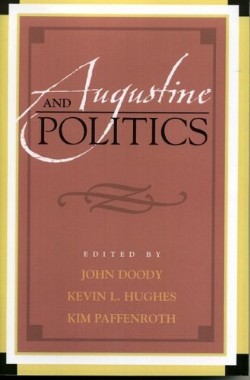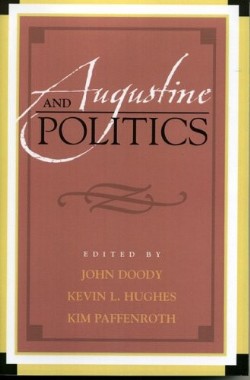John Doody
Showing all 2 resultsSorted by latest
-
Augustine And Politics
$54.99Add to cartDedicatory Preface
Thomas F. Martin O.S.A.
Introduction
John Doody, Kevin L. Hughes, And Kim Paffenroth
Human Nature And Virtue In Relation To PoliticsUnited Inwardly By Love: Augustine’s Social Ontology
Phillip Cary
Truthfulness As The Bond Of Society
Robert P. Kennedy
Friendship As Personal, Social, And Theological Virtue In Augustine
Kim Paffenroth
Freedom Beyond Our Choosing: Augustine On The Will And Its Objects
David C. Schindler
Augustine’s Theory And Critique Of PoliticsBetween The Two Cities: Political Action In Augustine Of Hippo
Robert Dodaro O.S.A.
Democracy And Its Demons
Michael Hanby
Local Politics: The Political Place Of The Household In Augustine’s City Of God
Kevin L. Hughes
Augustine And The Politics Of Monasticism
Thomas F. Martin O.S.A.
The Glory And Tragedy Of Politics
Thomas W. Smith
Augustinian Influence And PerspectivesToward A Contemporary Augustinian Understanding Of Politics
Todd Breyfogle
Sexual Purity, “the Faithful,” And Religious Reform In Eleventh-Century Italy: Donatism Revisited
Louis I. Hamilton
The Enchanted City Of Man: The State And The Market In Augustinian Perspective
Eugene McCarraher
Machiavelli’s City Of God: Civic Humanism And Augustinian Terror
Paul WrightAdditional Info
The study of Augustine’s political teachings has suffered from a history of misreadings, both ancient and modern. It is only in recent years that the traditional lines of “Augustinian pessimism” have been opened to question. Scholars have begun to explore the broader lines of Augustine’s political thought in his letters and sermons, and thus have been able to place his classic text, The City of God, in its proper context. The essays in this volume take stock of these recent developments and revisit old assumptions about the significance of Augustine of Hippo for political thought. They do so from many different perspectives, examining the anthropological and theological underpinnings of Augustine’s thought, his critique of politics, his development of his own political thought, and some of the later manifestations or uses of his thought in the Middle Ages, the Renaissance, and today. This new vision is at once more bracing, more hopeful, and more diverse than earlier readings could have allowed. -
Augustine And Politics
$140.00Add to cartDedicatory Preface
Thomas F. Martin O.S.A.
Introduction
John Doody, Kevin L. Hughes, And Kim Paffenroth
Human Nature And Virtue In Relation To PoliticsUnited Inwardly By Love: Augustine’s Social Ontology
Phillip Cary
Truthfulness As The Bond Of Society
Robert P. Kennedy
Friendship As Personal, Social, And Theological Virtue In Augustine
Kim Paffenroth
Freedom Beyond Our Choosing: Augustine On The Will And Its Objects
David C. Schindler
Augustine’s Theory And Critique Of PoliticsBetween The Two Cities: Political Action In Augustine Of Hippo
Robert Dodaro O.S.A.
Democracy And Its Demons
Michael Hanby
Local Politics: The Political Place Of The Household In Augustine’s City Of God
Kevin L. Hughes
Augustine And The Politics Of Monasticism
Thomas F. Martin O.S.A.
The Glory And Tragedy Of Politics
Thomas W. Smith
Augustinian Influence And PerspectivesToward A Contemporary Augustinian Understanding Of Politics
Todd Breyfogle
Sexual Purity, “the Faithful,” And Religious Reform In Eleventh-Century Italy: Donatism Revisited
Louis I. Hamilton
The Enchanted City Of Man: The State And The Market In Augustinian Perspective
Eugene McCarraher
Machiavelli’s City Of God: Civic Humanism And Augustinian Terror
Paul WrightAdditional Info
The study of Augustine’s political teachings has suffered from a history of misreadings, both ancient and modern. It is only in recent years that the traditional lines of “Augustinian pessimism” have been opened to question. Scholars have begun to explore the broader lines of Augustine’s political thought in his letters and sermons, and thus have been able to place his classic text, The City of God, in its proper context. The essays in this volume take stock of these recent developments and revisit old assumptions about the significance of Augustine of Hippo for political thought. They do so from many different perspectives, examining the anthropological and theological underpinnings of Augustine’s thought, his critique of politics, his development of his own political thought, and some of the later manifestations or uses of his thought in the Middle Ages, the Renaissance, and today. This new vision is at once more bracing, more hopeful, and more diverse than earlier readings could have allowed.


